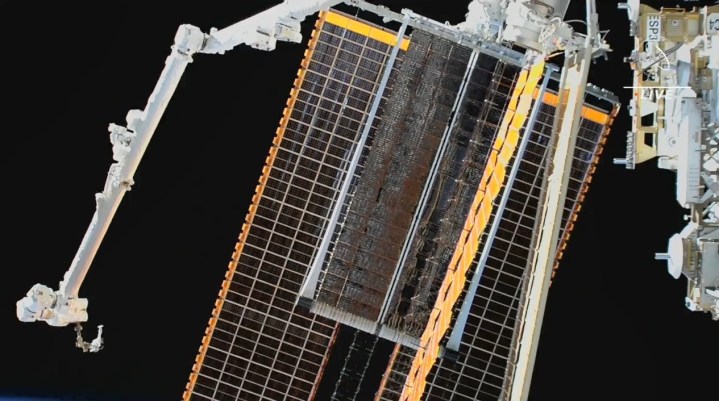
Two NASA astronauts completed a successful spacewalk at the International Space Station on Thursday.
Woody Hoburg and Steve Bowen ended their extravehicular activity at at 2:17 p.m. ET after spending 5 hours and 35 minutes working on the outside of the orbital outpost.
The pair accomplished the mission’s main goal, which was to install an IROSA (International Space Station rollout solar array) designed to boost power generation on the Earth-orbiting satellite.
NASA lives streamed the entire spacewalk and later released footage of the array slowly unfurling on the space station about 250 miles above Earth.
“The new array is 60 feet long by 20 feet wide (18.2 meters by 6 meters) and is shading a little more than half of the original array, which is 112 feet long by 39 feet wide,” NASA said in a report on Thursday’s spacewalk. “Each new IROSA produces more than 20 kilowatts of electricity and together enable a 30% increase in power production over the station’s current arrays.”
The work on upgrading the station’s power supply has been going on for several years and is still not complete, with additional arrays scheduled to be delivered and installed in 2025.
This week’s excursion was the 265th spacewalk in support of space station assembly, upgrades, and maintenance, NASA said.
It was the second spacewalk for Hoburg following his first one earlier this month, which the 37-year-old American described as “an incredible life experience.”
For Bowen, however, it was his 10th such activity, enabling him to share the record for the most spacewalks by a U.S. astronaut with Mike Lopez-Alegria, Bob Behnken, Peggy Whitson, and Chris Cassidy.
Astronauts began staying on the space station in 2000, and since then has been constantly inhabited by rotating crews. Despite the current power upgrades, the aging facility is likely to be decommissioned in 2031, though astronauts will continue to live and work in low-Earth orbit by staying aboard new, privately funded stations.
Editors’ Recommendations
Credit: Source link


Comments are closed.